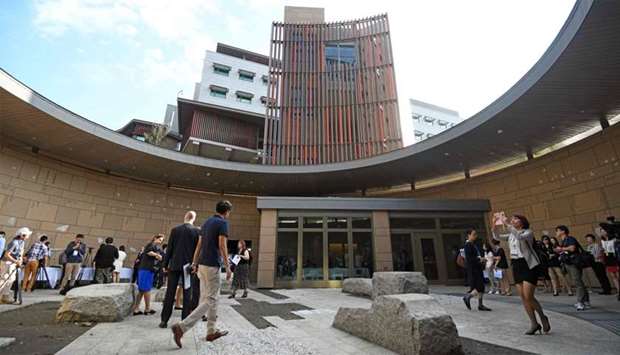The United States on Tuesday unveiled a new $255 million de facto embassy in Taiwan in what was hailed as a ‘milestone’ in relations, drawing the ire of China which considers the self-ruled island as part of its territory.
Donald Trump's administration is moving to strengthen ties with Taiwan in the face of China's diplomatic moves and military threats.
In March, after Trump approved new rules allowing top US officials to travel to the island, Beijing called on Washington to ‘correct its mistake’.
But the US sent an assistant secretary of state for the unveiling.
Beijing said it lodged an official diplomatic protest with Washington.
The US switched diplomatic recognition to China in 1979 but maintains close economic, political and security ties with Taiwan. It manages its relations through the American Institute in Taiwan (AIT).
Marie Royce, assistant secretary of state for educational and cultural affairs, attended the dedication ceremony with Taiwan's President Tsai Ing-wen.
‘AIT's new home is both a tangible symbol that reflects the strength of our ties and a state-of-the-art facility that will make possible even greater cooperation for years to come,’ said Royce, the wife of pro-Taiwan congressman and House foreign affairs committee chairman Ed Royce.
AIT chairman James Moriarty called the new complex a ‘milestone’ in the US-Taiwan relationship and a ‘testament to the strong US commitment to Taiwan’.
Tsai hailed the complex as a new chapter in the ‘great story of US-Taiwan relations’.
Chinese foreign ministry spokesman Geng Shuang said Beijing was ‘gravely concerned’ and launched ‘solemn representations’ with Washington -- diplomatic speak for an official protest.
‘If any US official attends this activity, whatever their excuse may be, it violates the one China principle,’ Geng told a regular press briefing.
‘We urge the US to honour its words on the Taiwan issue and redress it's wrongdoings so as to avoid doing harm to China-US ties and peace and stability in cross-straits relations.’
China and Taiwan have been ruled separately since 1949 but Beijing views the island as a renegade province awaiting reunification, by force if necessary.
It bars Taiwan from membership in the United Nations and many other international organisations and has been luring away the island's remaining diplomatic allies.
Since Tsai came to power two years ago, Beijing has cut contact with her government because Taipei refuses to acknowledge that Taiwan is part of ‘one China’.
Beijing officials have described intensified Chinese military drills near the island as a warning against any moves to assert its sovereignty.
While Taiwan's relationship with the US is essential to its security, it must also guard against provoking China, its biggest military threat but also the dominant market for the island's export-driven economy.
